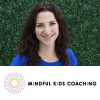
How do we stay calm in the face of our children’s struggles? This is a question near and dear to my heart, and something I work on with my clients all the time. It is both extremely important and extremely challenging to address our children’s emotions without unnecessarily taking them on ourselves. I often say that our children are genetically engineered to push our buttons. As parents, we often erroneously think of our children as extensions of us, and as a result, we take their successes and failures very personally. The experience of parenting also brings up all our emotional baggage from our own childhood experiences, and if we are not careful, we risk unconsciously dropping our own traumas in our children’s laps. Part of learning to control our own emotions is becoming aware of how all of these factors impact our experiences as parents. As we become more conscious parents, we can more easily identify and work on our own baggage, so that we can show up more fully for our children.
Here are four things you can do to learn to manage your emotions when parenting your children:
1. Recognize when you are emotionally activated. This is an essential first step for becoming a more conscious parent. Oftentimes, in the height of our emotions, we unconsciously react to situations with our children without taking the time to tune into what we are experiencing so we can respond to the situation appropriately. The more we can recognize when we are emotionally activated, the easier it will be using our tools and calming strategies so that we can calmly choose the best way to respond.
2. Cultivate mindful awareness. Being mindful means being consciously aware of our experiences, without judging them. The mindful parent can tune into what is going on both internally and externally in the world, and purposefully respond rather than blindly react to those experiences. Mindful meditation is one of the best ways to cultivate this awareness. But you can practice mindfulness anywhere while doing anything from washing the dishes to driving your car. It is best to start out with these practices when you are already in a relatively calm state. With time and practice, you will find that you naturally become more present, even when you are more emotionally activated.
3. Use calming strategies. Our kids learn more from our actions than from our words. When you model self-calming strategies, they will likely follow suit. One of my favorite strategies is to simply give yourself a “time out” to regroup and reset your emotional system. Another great way to calm yourself down is to practice deep belly breathing. There are many great apps and books that teach different breathing techniques. Since everyone is different, you may have to try out a few different approaches until you find the one that fits. Many people find that simply naming what they are feeling helps them to settle down. It is important to simply notice and describe what you are feeling, without thinking too hard or telling yourself a story about the experience (i.e., “I am feeling angry right now” is better than “I am angry because never listen to me”).
Victoria Shaw is a Licensed Professional Counselor and Spiritual Coach who combines her training in psychology and counseling with her intuitive gifts to help clients heal, grow and realize their spiritual and full personal potential. She specializes in working with highly sensitive and intuitive children and teens, and their parents to help them heal their hurts, open their hearts and reach their highest potential. She is the author of four self-help books for parents, children, and teens and the mother of two highly sensitive and intuitive children.































